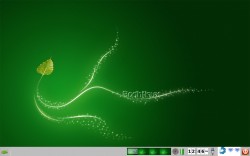
Until recently, most desktop Linux distros were about the same on the surface. What differentiated them were things like configurability. Some distros, those preferred by Linux purists or designed primarily to be used as servers, required users to open a terminal and change settings with a text editor. Others sought to be newbie friendly, and had devised schemes so that most systems settings could be done point and click, just like with that evil operating system from Redmond.
On the surface, though, whether newbie friendly or designed for geeks, the user was mainly offered an out-of-the-box desktop, usually KDE or GNOME, that was maybe dressed-up a bit with the distro’s logo but otherwise seemingly added almost as an afterthought.
Christine Hall has been a journalist since 1971. In 2001, she began writing a weekly consumer computer column and started covering Linux and FOSS in 2002 after making the switch to GNU/Linux. Follow her on Twitter: @BrideOfLinux






